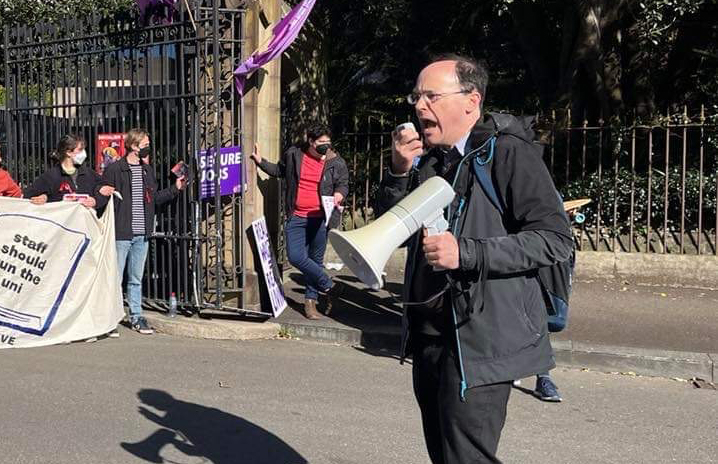
Staff and students picketed all entrances of the University of Sydney (USyd) entrances on August 17 as part of the National Tertiary Education Union’s (NTEU) enterprise bargaining claim. It was the fourth day of strike action this year.
Hundreds of NTEU members and student supporters linked arms at entrances to press home their demands for fair work rights.
The NTEU branch has been fighting for a pay rise above inflation and an end to forced redundancies since August last year.
It wants an end to casualisation and more rights for professional staff to work from home as part its new enterprise agreement. It is also pushing to protect academics’ right to research allocations, enforceable targets for First Nations employment and an end to overwork and exploitative employment conditions.
“We want a University that actually cares about staff overworking, that looks after students properly,” NTEU USyd president Nick Riemer told student newspaper Honi Soit on August 17.
Riemer said since the last two rounds of strikes the union has “won workload control mechanisms for professional staff for the first time, and softened management’s attack on the teaching-research nexus and on academic workload regulation”.
Riemer applauded the record turn-out on August 17 saying that thanks to ongoing mobilisation and strike action “our branch now has more members than we have had for absolutely years”.
History lecturer David Brophy told Honi Soit how the pickets help the union pursue its enterprise agreement. “We want to make it really difficult for people to come on campus … we want them to hear from not just one of us, but, ideally, many of us, as to why they shouldn’t come on to campus.”
Strikers gathered at the City Road picket in the afternoon to hear about progress on the work agreement. “We have seen movement from those people up there since our last strike,” Reimer said. “[Management is] telling us that they’re gonna come at us with a serious de-casualisation deal.”
However, Reimer said management will need to create 880 permanent teaching and research jobs to make up for unpaid work by casual staff. He said the jobs could be funded using reserves from the university’s $1.04 billion surplus last year.
usyd_strike_2_pip.jpg

Ella Pash, a second-year computer science student, told City Hub that strikers are also “fighting to make the university give 30 days of gender affirmation leave” to allow trans people to “take the time off work and pursue any kind of transitioning”.
USyd law teacher, researcher and NTEU member Scarlet Wilcock told Green Left that the university is trying to end the 40/40/20 research-teaching split. She said its attempts to create a “flexible” workforce undermines the “philosophy of the university” and would have “serious negative flow-on effects”.
Wilcock said the amount of unpaid labour staff do has been “steadily increasing”. It is “detrimental to our work, our health and our students”.
USyd postdoctoral Gender and Cultural Studies teacher and NTEU member Grace Sharkey told City Hub: “I want appropriate pay for marking ... we’re paid to mark an essay in about fifteen minutes. “This means that either we’re only able to skim an essay or we have to work way over our allotted time in order to give students appropriate feedback.”
The NTEU is planning its next strike on Open Day on August 27.